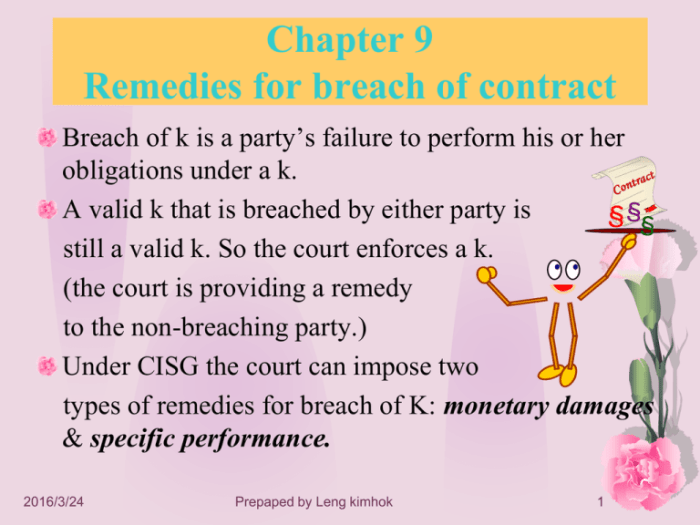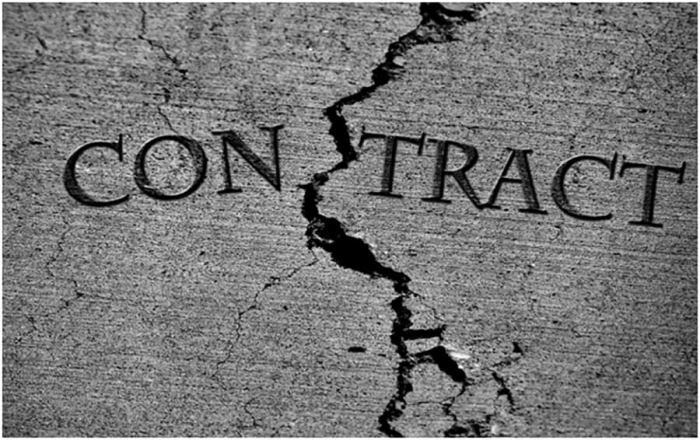Any breach discharges the non breaching party from the contract – The principle that “any breach discharges the non-breaching party from the contract” holds significant sway in contract law, establishing a fundamental right for parties to terminate their obligations in the event of a breach. This principle, deeply rooted in legal precedent, provides a comprehensive framework for understanding the consequences of contractual breaches and their impact on the rights and remedies of both parties.
The concept of discharge in contract law encompasses the legal termination of contractual obligations, releasing parties from their respective performance requirements. A breach occurs when one party fails to fulfill their contractual commitments, while the non-breaching party refers to the party who has not committed a breach.
The legal basis for the principle that “any breach discharges the non-breaching party” stems from the fundamental principle of fairness and the need to protect non-breaching parties from the adverse consequences of breaches.
1. Definition and Scope of Discharge

In contract law, discharge refers to the termination of contractual obligations and the release from performance. A breach occurs when one party fails to fulfill their contractual obligations, while the non-breaching party is the party who has not breached the contract.
The legal basis for the principle that “any breach discharges the non-breaching party from the contract” lies in the concept of mutuality of obligation. This principle holds that both parties to a contract must fulfill their respective obligations for the contract to remain in force.
If one party breaches the contract, the other party is no longer obligated to perform their own obligations.
2. Exceptions and Qualifications

There are certain exceptions and qualifications to the general rule that any breach discharges the non-breaching party. One exception is the concept of “material breach.” A material breach is a breach that goes to the heart of the contract and makes it impossible for the non-breaching party to receive the benefit of the contract.
The severity of the breach may also affect the non-breaching party’s right to discharge. Minor breaches may not be sufficient to discharge the non-breaching party, while material breaches will likely result in discharge.
3. Consequences of Discharge: Any Breach Discharges The Non Breaching Party From The Contract

A discharge for the non-breaching party has several legal consequences. First, it terminates all contractual obligations between the parties. Second, it releases the non-breaching party from performance of their own obligations. Third, it may affect the rights and remedies of both parties, such as the right to damages or specific performance.
4. Practical Implications

The principle of discharge has been applied in numerous legal cases. For example, in the case of Jacob & Youngs, Inc. v. Kent, the court held that a buyer was discharged from their obligation to purchase goods when the seller failed to deliver the goods on time.
Parties should carefully consider the strategic implications of invoking the principle of discharge. Discharge can be a powerful tool for non-breaching parties, but it can also have negative consequences, such as the loss of the benefit of the contract.
Common Queries
What constitutes a breach of contract?
A breach of contract occurs when one party fails to fulfill their contractual obligations, either through non-performance or defective performance.
What are the exceptions to the rule that “any breach discharges the non-breaching party”?
Exceptions to this rule include cases of minor breaches, where the breach is not substantial enough to warrant discharge, and cases where the non-breaching party has waived their right to discharge.
What are the consequences of discharge for the non-breaching party?
Discharge releases the non-breaching party from their contractual obligations and entitles them to seek remedies for the breach, such as damages or specific performance.